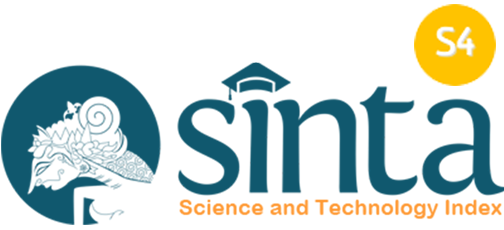DINAMIKA BELAJAR BERDASAR REGULASI DIRI DALAM PROSES PSIKOTERAPI KELOMPOK PSIKODINAMIKA
DOI:
https://doi.org/10.21154/rosyada.v3i2.5070Abstract
Psikoterapi kelompok memiliki keunggulan untuk mengatasi persoalan terkait relasi manusia, karena situasi dalam psikoterapi kelompok merupakan prototipe dunia sosial sesungguhnya. Selain itu, faktor keberhasilan dalam psikoterapi diantaranya proses belajar dalam menjalani psikoterapi kelompok tersebut. Penelitian ini ingin memelajari dinamika Belajar Berdasar Regulasi Diri (BBRD) dalam proses psikoterapi kelompok psikodinamika Metode penelitian ini menggunakan pendekatan kualitatif yaitu merekam proses BBRD yang terjadi praintervensi, selama intervensi, pascaintervensi psikoterapi kelompok psikodinamika tindak lanjut selepas intervensi. Hasil penelitian menunjukkan bahwa partisipan merasakan manfaat mengikuti proses psikoterapi kelompok.
References
Azevedo, R., and A. Hadwin. “Scaffolding Self-Regulated Learning and Metacognition”” Implications for the Design of Computer-Based Scaffolds.” Instructional Science 33 (2005): 367”“79. https://doi.org/10.1007/s11251-005-1272-9.
Azevedo, R. Moos, D. C. Greene, J. A. Winters, F. I. Comley, and J. G. “Why Is Externally-Facilitated Regulated Learning More Than Self Regulated Learning With Hypermedia.” Educational Tech Research Dev 11, no. 1 (2008): 61”“79. http://ezproxy.ugm.ac.id:2066.
Barnard-Bark, V. O., L. Lan, and W. Y. Paton. “Profiles in Aself-Regulated Learning in the Online Learning Environment.” International Review of Research in Open and Distance Learning 11, no. 1 (2010): 61”“79. http:ezproxy.ugm.ac.id:2066.
Brabender, V. A., A. E. Fallon, and A. I. Smolar. Essential of Group Therapy. New Jersey: John Wiley & Sons, Inc, 2004.
Campbell, C. “Middle Years Student Use of Self-Regulating Strategies in An Online Journaling Environment.” Educational & Society 12, no. 3 (2009): 98”“109.
Corsini, R. J., D. Wedding, and (Ed). Current Psychotherapies. 8th ed. USA: Thomson Brooks/Cole, 2008. http://books.google.co.id.
Fajriah, L. “Hubungan Antara Pembelajaran Berpusat Mahasiswa Dan Jenis Kelamin Degan Belajar BerdasarRegulasi Diri Pada Mahasiswa Peserta Mata Kukiah Psikologi Pendidikan Fakultas Psikologi Dan Ilmu Sosial Budaya Universitas Islam Indonesia.” Universitas Islam Indoensia, 2011.
Johansson, P., P. Hoglend, S. Amlo, K. J. Bogwald, R. Ulberg, A. Marble, O. Sorbye, O. Heyerdahl, and M. C. Sjaastad. “The Mediating Role of Insight for Long-Term Improvement in Psychodinamic Therapy.” Journal of Consulting and Clinical Psychology 78, no. 3 (2010): 438”“48. https://doi.org/10.1037/a0019245.
Lemma, A., M. Target, and P. Fonagy. “TheDefelopment of a Brief Psychodynamic Intervention (Dinamic Interpersonal Therapy) and Its Application to Depression: A Pilot Stydy.” Psychiatry 7, no. 1 (2011): 41”“48. http://ezproxy.ugm.ac.id:2066.
Matuga, J. M. “Self-Regulation, Goal Orientation, and Academic Achievment of Secondary Student in Online University Courses.” Educational Technology & Society 12, no. 13 (2009): 4”“11.
Meier, A., M. Boivin, and M. Meier. “Theme-Analysis: Procedures and Application for Psychotherapy Research.” Quallitative Research in Psychology 5 (2008): 289”“310. https://doi.org/10.1080/14780880802070526.
Ormrod, J. E. Educational Psychology: Defeloping Learners. 5th ed. New Jersey: Pearson Merrill Prentice Hall, 2006.
””””””. Human Learning. New Jersey: Pearson Merrill Prentice Hall, 2004.
Overholser, J. C. “Group Psychotherapy and Existential Concern: An Interview with Irvin Yalom.” Journal of Contemporary Psychotherapy 35, no. 2 (2005): 185”“97. https://doi.org/10.1007/s10879-005-2699-7.
Prawitasari, J. E. Psikologi Klinis: Pengantar Terapan Mikro & Makro. Jakarta: Penerbit Erlangga, 2011.
Prochaska, J., and J. Norcross. System of Sychotherapy: A Transtheoretical Analysis. 6th ed. USA: Thomson Brooks/Cole, 2007.
Sattler, J. M. Assessment of Children Behavioral and Clinical Application Fourth Edition. San Diego: Jerome M. Sattler Publisher, 2002.
Schunk, D. H. Learning Theories: An Educational Perspective. New Jersey: Pearson Merrill Prentice Hall, 2008.
Shadish, W. R., T. D. Cook, and D. T. Campbell. Experimental and Quasi-Experimental Design for Generalized Causal Inference. New York: Houghton Mifflin Company, 2002.
Sprafkin, R. P., N. J. Gershaw, and A. P. Goldstein. Social Skills for Mental Health, a Structured Learning Approach. Boston: Allyn & Bacon, 1993.
Susetyo, Y. F. Orientasi Tujuan, Atribusi Penyebab, Dan Belajar Berdasar Regulasi Diri Siswa Sekolah Menengah Atas Di Yogyakarta. Yogyakarta: Magister Sains Psikolohi UGM, 2007.
VandenBoss, G.R. (Ed). APA Dictionary of Psychology. 1st ed. Washingtopn DC: American Psychological Association, 2007.
Zimmerman, B.J. “A Social Cognitive View of Self-Regulated Academic Learning.” Journal of Educational Psychology 81, no. 3 (1989): 329”“339.
””””””. “Self Regulated Learning and Academic Achievement: An Overview.” Educational Psychologist 25, no. 1 (1990): 3”“17. http://ezproxy.ugm.ac.id:2066.




